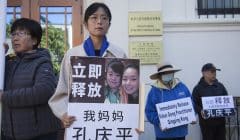Beijing Exports Repressive Agenda
An elderly man is surrounded by an angry crowd, who chant “traitor” in unison and denounce him as a political enemy. He is accused of betraying the motherland, and for his alleged crime, he is punched, strangled, and spat on in a scene of public humiliation, as communist red flags wave in the background.
Anyone who didn’t join in the denouncement risked becoming a target themselves, and thus the crowd grew. No one in the mob knew the man. No one even knew his name. They only knew that the Communist Party wanted an example made of him. “Animal,” they screamed. “You aren’t even human,” they scolded as he stood, stoic yet scared.
It’s a scene reminiscent of the Cultural Revolution that wreaked chaos in China in the 60s and 70s. Yet this scene did not take place in China, nor in decades past. This occurred just weeks ago, in one of the most diverse and progressive places in the world – New York City.
Since May 17th, crowds of ethnic Chinese – on same days numbering in the hundreds – have amassed every day in the predominantly ethnic Chinese neighborhood of Flushing, Queens. They have a singular purpose: to surround, heckle, threaten and assault anyone identified as an adherent of Falun Gong – a peaceful spiritual discipline banned and persecuted by China’s communist government.
These attacks in New York have been accompanied by threats such as “I’ll kill you, I’m not kidding, I will kill you,” “Falun Gong is not human,” and “eradicate Falun Gong.”
In a phone conversation with an undercover reporter, the Chinese Consul-General in New York City admitted to orchestrating and supporting the event, and has implicated the Chinese Consulate, stating that they “had to be very careful with this kind of [event]” and that he “shook hands with them [the mob] one by one and thanked them.”
Falun Gong adherents in Mainland China are no strangers to state-sanctioned violence. Once a popular and widely accepted system of meditation and moral self-improvement, Falun Gong was banned in China in July of 1999, after its popularity swelled to outnumber the membership of the Chinese Communist Party itself.
Resenting its popularity, or perhaps seeing it as an ideological threat, then-Communist Party boss Jiang Zemin initiated a campaign to wipe out Falun Gong, and within months the first reports of torture deaths began leaking out of China. As of the time of this report, over 3,150 confirmed death cases have emerged. In 2005, of all the Chinese torture cases reported through the United Nations, fully two-thirds were Falun Gong adherents, who by some estimates comprise as much as half of China’s labor camp population.
Beijing’s campaign against Falun Gong hasn’t stopped at its own borders. In October 2000, top Chinese Communist Party leader Jiang Zemin ordered to “intensify the campaign [against Falun Gong] overseas, collect more information and prevent protests,” according to a leaked Party document. Since then, adherents of the Falun Gong outside China have seen their tires slashed, their homes vandalized, their e-mail accounts hacked and their phones tapped; they have received death threats, have been beaten and even shot.
Among the more notable instances of violence against Falun Gong outside China’s borders include the following:
- In September, 2001, Falun Gong adherents demonstrating against the persecution outside of Chicago’s Chinese Consulate were verbally accosted and beaten by ethnic Chinese men. The men, who were known by many in the Chinese community as having close ties with the Chinese consulate, were convicted of battery.
- In February 2006, a Falun Gong adherent who worked to override China’s internet blockade had his Atlanta home broken into by assailants who beat him with a gun handle and left him needing multiple stitches to his forehead. All that was stolen was a laptop computer and files, but no valuables.
- In December 2001, the Chinese Embassy in Ottawa, Canada hosted an “anti-Falun Gong” exhibit, inviting over 300 Chinese community members to attend. One of the guests, a Falun Gong adherent, took a picture of the display. He was then forced into a back room and physically assaulted by embassy staff.
- Between 1999 and 2003, the apartment of Falun Gong spokeswoman Gail Rachlin was broken into five times. The only items taken were her address book, tax records, and Falun Gong-related materials.
Supporters of Falun Gong – or would-be supporters, as is sometimes the case – are similarly targeted. Elected officials at all levels of government who have expressed support for Falun Gong have reported receiving letters from Chinese consulates or embassies warning them not to associate with the meditation practice, nor condemn its persecution, lest trade or diplomatic relations with China be tarnished.
Members of the Western media have also been approached; writing in a 2004 article for Canada’s National Post, John Turley-Ewart recalled how a Chinese diplomat paid him a visit to trumpet the virtues of the Communist Party and instruct him on how to report on Falun Gong.
So persistent has been the Chinese government’s overseas campaign against Falun Gong that in 2004, U.S. Congress unanimously passed House Concurrent Resolution 304, which demanded that Beijing “cease using the diplomatic missions in the United States to spread falsehoods about the nature of Falun Gong” and discontinue the intimidation against Falun Gong adherents at home and abroad.
Yet the most insidious dimension to all of this is that the Chinese diplomatic missions do not act alone. As Gerard Smith’s article “Unpeaceful Rise on Campus” on page 6 illustrates, China’s diplomatic missions also employ front organizations in the Chinese community to act at their behest.
This was what the world witnessed during the Beijing Olympic Torch Relay, which was greeted in the United States, Australia, South Korea and elsewhere by massive crowds of flag-waving Chinese, many of whom were asked to attend by organizations to which they belonged.
During the torch’s San Francisco leg, reporter Rodger Baker noted that that the meticulously organized pro-Beijing crowd had been bussed in from all over California, and were being provided food, water and even pay (rumored as much as $300) to wave the communist flag and drown out protesters.
And it is also what is occurring in Flushing, where participants in the anti-Falun Gong mob carry identical green iPhone casings, and some speak of receiving $90/day to berate Falun Gong adherents.
There is now talk of expelling the Chinese Consul-General in New York who confessed to encouraging or even instigating the events there, his actions having contravened his diplomatic duties as outlined in the Vienna Convention on Consular Relations.
But even then, a far larger problem remains.
“What we’re witnessing in all this is a foreign communist government that’s willing and able to extend a repressive agenda in the United States through coercive—and often illegal—means. Today they’re targeting Falun Gong, but tomorrow, who knows?,” says Levi Browde, Deputy Executive Director for the New York-based Falun Dafa Information Center.
“It should be disturbing to all Americans that the Chinese regime has such a formidable organizational capacity in this country. This is precisely a homeland security threat, and one for which we may be very unprepared to face because it’s all happening right here in our backyards. I’ll tell you this much….it has me looking over my shoulder.”






